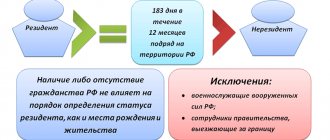At a minimum, seizure of property means a ban on the right of disposal. While it is in effect, a citizen will not be able to sell, donate or otherwise transfer his property into the possession of third parties. In practice, having learned about the existence of restrictions and realizing that they may soon lose their property altogether, the owner of the property tries to sell it in order to gain at least some money. Therefore, you need to know how to check the seizure of property for the buyer, since he is the most vulnerable party. To do this, you need to contact government agencies in person or look up the information of interest online, on the website of some services.
Using the Rosreestr website - free
This site provides information for free. Please note that it is not always possible to obtain reliable data on this Internet resource; sometimes it is loaded with an error. If you decide to use this method, follow these instructions:
- Go to the reference information section about real estate objects of Rosester.
- Indicate the cadastral, previously assigned or conditional apartment number. You can specify the address of the apartment and click on the button to create a request.
- In the results obtained, click on the address of your apartment. If it is not displayed, it means that there is no information about this property in the unified register.
- Go to the section with rights and restrictions. The line will indicate whether the property is under arrest. The reasons for the restrictions will not be reflected.
Removal of arrest by bailiffs from a salary card
Part of the salary will continue to be withheld until the debt is repaid in full. When this happens, the bailiff will issue a termination order and send a notice to the bank that no money needs to be written off. After this, the salary will be calculated in full.
“The most obvious solution in this situation is to pay off the debt,” notes Alla Semenova. — When a card is seized, you cannot remain indifferent; you must approach this problem responsibly. Find out the reasons, try to restructure the debt, discuss its repayment schedule with a FSSP employee. In this case, the consequences will not be as critical as when the account is seized and all proceeds are written off from it.”
Using an extract from the Unified State Register of Real Estate
This is the most reliable and reliable method. You can receive an extract in electronic or paper form; the former is cheaper, it is convenient to issue it online, or open it on a computer or mobile device.
Information is provided on the Rosreestr website or using paid services, one of which is the well-known website ktotam.pro. Below is a table that reflects the features of two Internet resources.
| Service name | Receipt time | Service cost | Receipt form | Convenience |
| rosreestronline.ru | Approximate time – 48 hours. That's quite a long wait | 290 rubles per document | The document arrives in an inconvenient .xml format that needs to be converted into readable form | The site is inconvenient to use; you will have to fill out many fields to fill out an application |
| ktotam.pro | Information can be received within an hour | 250 rubles per extract, 150 rubles per package of five documents | The statement can be immediately opened on a computer or smartphone; no additional reformatting is required | A small number of fields, you can leave a request in a few minutes |
Here are the instructions for obtaining information on the service:
- Go to the website and indicate your exact apartment address.
- In the window that appears, check the address and click on select an object.
- Select an extract from the unified register for 250 rubles and click on the “Next” button.
- Enter your email in a new window.
- The next step is choosing a payment method and depositing money (using a bank card, electronic wallets).
- Log in to your personal account using your login and password, which you will receive by email.
- Log in to your account to check the processing of your order.
- The statements section will show that the status is being processed.
Tools
- In your profile, you can write a phone number to which an SMS will be sent indicating the document is ready.
- After receiving a notification by phone or email, click on the view button. You will immediately receive a statement in PDF format, which will open on any electronic device.
Which authorities have the right to seize an apartment?
A judge or bailiff can apply a restriction in the form of seizure of an apartment. The court makes a corresponding decision during court hearings to secure the statement of claim (clause 1, part 1, article 140 of the Code of Civil Procedure of the Russian Federation), and the executive service - on the basis of a court writ of execution or within the framework of an enforcement case (part 1, article 80 of the Federal Law "On enforcement proceedings").
When investigating criminal cases, seizure of property can also be requested by investigative or inquiry bodies (Article 115 of the Code of Criminal Procedure of the Russian Federation), and in the course of their activities, tax authorities or the customs service can initiate a ban (Part 1 of Article 77 of the Tax Code of the Russian Federation).
Reasons for seizure of housing
The procedure is carried out within the framework of enforcement proceedings to ensure compliance with the court decision. The main reasons include the following:
- If the debtor deliberately conceals his income, there is a risk that he will give the apartment to a close relative or friend in order to avoid liability.
- A party lacks money to pay off obligations. The apartment will be used to satisfy the claimant's claims.
- Malicious refusal to pay a debt, missing a voluntary deadline for repayment.
- The debtor does not have an official place of work.
Debts on utility bills, alimony, loans, fines from government agencies, as a result of compensation within the framework of an initiated criminal case, can lead to the seizure of the apartment.
Removal of arrest imposed by mistake
It also happens that a salary card is seized unreasonably. Such situations, according to Alla Semenova, are not uncommon. The reason is that bailiffs use only “basic” data to identify debtors: first and last name, date and place of birth. If this information is the same for several people, the full namesake may well suffer due to a technical error.
In this case, you need to find out the details of the bailiff on the FSSP website and contact him personally with a statement. In this application, you should indicate the fact of the error and provide information that allows you to accurately identify you: passport data, SNILS number. A copy of the application should be sent to the main and regional departments of the FSSP.
After reconciliation of the data, the decision regarding the “namesake” will be canceled, and the money written off will be returned. How quickly this will be done depends on whether the bailiff managed to transfer the funds to the collector or whether they are still on his deposit.
pixabay.com/stevepb
Who can seize
The procedure is carried out by bailiffs or a court with the issuance of an appropriate decision. Restrictive measures can be imposed upon the claimant’s application, which is sent to one of these authorities.
Articles:
Checking debt on utility bills (housing and communal services)
Seizure of the debtor's only home by bailiffs
What can be disputed
The bailiff cannot describe things that do not belong to the debtor. However, if there is no document proving ownership, the thing, as a general rule, is considered the property of the defaulter and will be described.
Often the bailiffs are in a hurry and describe everything that catches their eye. You can appeal if:
- interior items and personal items not related to luxury;
- household essentials: refrigerator, stove;
- food, money sufficient for the subsistence level of the debtor and his family members;
- pets not intended for breeding and sale;
- coal, firewood, etc. for cooking or heating;
- state awards;
- things and transport, if the debtor is disabled;
- tools or equipment for professional activities.
Also, the only housing and the land plot on which it is located are not subject to foreclosure. An exception is housing that is pledged to the bank if the bank is the plaintiff in the case.
A complete list of property that cannot be seized is given in Art. 446 Code of Civil Procedure of the Russian Federation. You can challenge the act in court if material assets are seized in an amount exceeding the amount of the debt.
How an arrest is made
At the request of one party, the court or a representative of the FSSP makes a decision on a compulsory measure, a photocopy of which is sent to the participants in the process. The appeal is considered within 10 days. If the court seizes the apartment on account of the claim, the judge issues a ruling, on the basis of which a writ of execution is drawn up to be handed over to the bailiff. Documents are transferred to a unified register within three days, after which information about the imposition of restrictions must be recorded in it.
The defendant may be allowed to live in the apartment, but is prohibited from conducting real estate transactions, including sales, rentals, and donations. In some cases, residents are forcibly evicted from the premises.
Why doesn't the bank report restrictions?
According to the law, the bank is not obliged to do this; this is the task of the FSSP employee. However, the position of banking institutions is usually determined by their ethics towards customers. Some not only inform the client about the arrest of the account, but also provide information about the bailiff who imposed the arrest and the amount of the penalty. Others do not do this, and provide information only when the client calls or comes to the branch to find out where his salary disappeared from the card.
No bank will act contrary to a lawful court decision or hide client accounts from the FSSP, no matter how “valuable” it may be. The concept of “bank secrecy” does not work here. The law obliges banks to provide information about the accounts of debtor clients. And since the information is transferred to a government agency, there is no violation of bank secrecy. There is no point in blaming a financial institution for this.
How to remove an arrest
The only way to eliminate restrictions is to pay off the debt in full. Sometimes bailiffs accommodate the debtor if he regularly pays his obligations in several installments. In this case, you can submit a petition to lift the arrest to the territorial division of the FSSP. Please provide the following:
- Bailiff's details.
- Information about the applicant.
- Document's name.
- Number of enforcement proceedings.
- Data about the property.
- We request that the arrest be lifted because such measures are no longer necessary.
- Justification (appearance of a disabled dependent, payment of most of the debt, conclusion of a settlement agreement with the other party).
- Applications, signature and date.
Try to keep it within five days
When a bank receives a request from a government enforcement agency, it acts quickly: funds can be debited from the card within a few hours. They are sent to a special deposit of a FSSP employee, where they remain for five days, after which they are sent to the claimant.
While the money is on the bailiff’s deposit, there is a possibility of returning it. After receiving the documents, the specialist has the right to return the part to the debtor if it is proven that it is impossible to foreclose on these funds. But if five days have passed and the tranche has been sent to the creditor, you will have to say goodbye to this amount: all of it will be used to repay the debt.
Appealing the seizure of real estate in the courts
Appealing against arrest is an inalienable right of the debtor (Part 1 of Article 441 of the Code of Civil Procedure of the Russian Federation). The bailiff is obliged to comply with the law and not violate the following points:
- The presence of bailiffs is allowed only in housing owned by the debtor.
- Inventory of housing and confiscation are permitted only with the written permission of a superior bailiff.
- Enforcement actions are not permitted at night or on weekends.
Violation of the above points serves as a reason for appealing the actions of the perpetrators and illegal arrest on the basis of Art. 442 Code of Civil Procedure of the Russian Federation.
Statement of claim
To lift the arrest by filing a claim, you need to prepare a corresponding application and submit it to the court. Filing a claim is limited by two deadlines: a three-year limitation period from the moment the ban was imposed (Part 1 of Article 196 of the Civil Procedure Code of the Russian Federation) and the moment of sale of housing as part of confiscation (Part 1 of Article 442 of the Civil Procedure Code of the Russian Federation).
In the claim, the applicant states the following:
- time of inventory of property and application of arrest;
- the resolution that initiated the sanctions;
- characteristics of real estate.
In the text, it is important to note the bailiff’s procedural violations, if any, and argue your position. Attached to the claim:
- check for payment of state duty;
- a copy of the arrest warrant;
- documents confirming ownership of the apartment;
- documentation to substantiate the applicant’s position on the illegal application of the ban.









